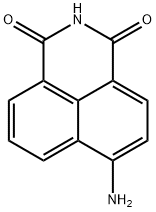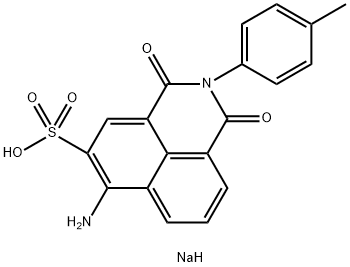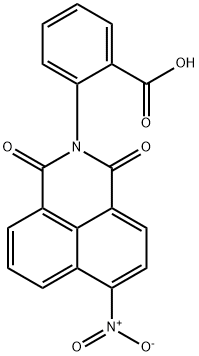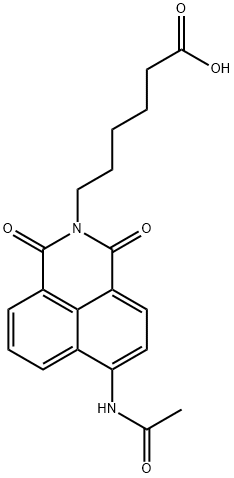4-Amino-1,8-naphthalimide , 95% , 1742-95-6
CAS NO.:1742-95-6
Empirical Formula: C12H8N2O2
Molecular Weight: 212.2
MDL number: MFCD00006921
EINECS: 217-110-1
| Pack Size | Price | Stock | Quantity |
| 100mg | RMB271.20 | In Stock |
|
| 250mg | RMB460.00 | In Stock |
|
| 1g | RMB1240.00 | In Stock |
|
| others | Enquire |
PRODUCT Properties
| Melting point: | 360 °C |
| Boiling point: | 352.04°C (rough estimate) |
| Density | 1.105 g/mL at 25 °C(lit.) |
| vapor pressure | 0Pa at 25℃ |
| refractive index | 1.6000 (estimate) |
| storage temp. | -20°C |
| solubility | Soluble in DMSO |
| form | Orange solid. |
| pka | 9.53±0.20(Predicted) |
| color | Yellow to brown |
| Water Solubility | 354mg/L at 25℃ |
| LogP | 1.08 |
| CAS DataBase Reference | 1742-95-6 |
| EPA Substance Registry System | 1H-Benz[de]isoquinoline-1,3(2H)-dione, 6-amino- (1742-95-6) |
Description and Uses
The poly(ADP-ribose) polymerases (PARPs) form a family of enzymes with roles in DNA repair and apoptosis, particularly in response to reactive oxygen and nitrogen species. 4-amino-1,8-Naphthalimide (4-ANI) is an inhibitor of PARP (IC50 = 180 nM). It blocks radiation-induced PARP in cancer cells, potentiating the cytotoxicity of γ-radiation, although it is not cytotoxic in the absence of radiation. 4-ANI is used to study the role of PARP activity in various cell systems.
The poly(ADP-ribose) polymerases (PARPs) form a family of enzymes with roles in DNA repair and apoptosis, particularly in response to reactive oxygen and nitrogen species. 4-amino-1,8-Naphthalimide (4-ANI) is an inhibitor of PARP (IC50 = 180 nM). It blocks radiation-induced PARP in cancer cells, potentiating the cytotoxicity of γ-radiation, although it is not cytotoxic in the absence of radiation. 4-ANI is used to study the role of PARP activity in various cell systems.
Safety
| Symbol(GHS) |  GHS07 |
| Signal word | Warning |
| Hazard statements | H315-H319-H335 |
| Precautionary statements | P261-P264-P271-P280-P302+P352-P305+P351+P338 |
| Hazard Codes | Xi |
| Risk Statements | 36/37/38 |
| Safety Statements | 26-37/39 |
| WGK Germany | 3 |
| RTECS | DE4081000 |
| TSCA | Yes |
| HS Code | 29251995 |





![6-Amino-2-(2-hydroxyethyl)-1,3-dioxo-2,3-dihydro-1H-benzo[de]isoquinoline-5-sulfonicacid](https://img.chemicalbook.com/StructureFile/ChemBookStructure2/GIF/CB1724923.gif)